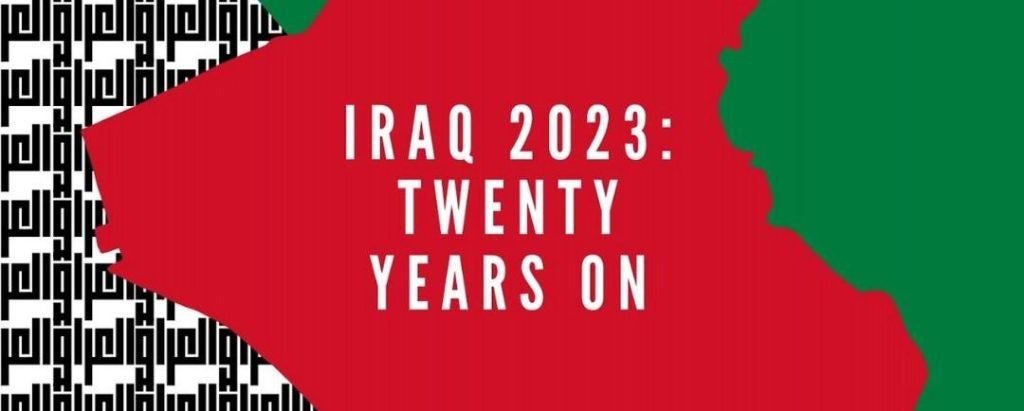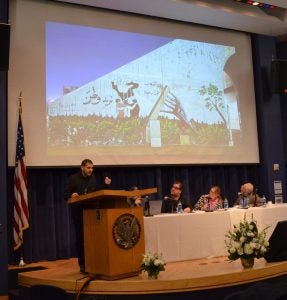
Commemorating the 2003 invasion of Iraq twenty years on, CCAS hosted a conference exploring the invasion’s economic, social, and geopolitical consequences, as well as its representation in Iraqi arts and culture. The conference, held on March 31 in partnership with George Mason University’s Middle East and Islamic Studies Program and the Arab Studies Institute, also included a screening of the 2004 documentary, About Baghdad, the first film made after the fall of the Ba‘th regime. The film screening provided a way of foregrounding native Iraqi voices and perspective on the aftermath of the war and was followed by a discussion with the film’s directors.
The conference’s first panel session, titled “The Invasion of Iraq and After: Twenty Years On,” offered concise insights from a broad range of angles: the occupying forces, the state, the geopolitical order, and most importantly, ordinary Iraqis. It convened panelists with a considerable history of intellectual engagement with the subject, who had the challenge of presenting their work in only twelve minutes each—twelve minutes for “twenty years and more, and one million lives,” remarked Iraqi writer Sinan Antoon on the magnitude of responsibility in the task at hand. With emphasis on the process of constructing historical narratives while silencing certain historical events, Antoon highlighted how the “United States of Amnesia” has ignored or romanticized its actions (read congenital crimes) in the 1991 Gulf War and the 2003 invasion of Iraq. These actions, he asserted, led to the devastation of Iraq’s infrastructure, economic collapse, and the suffering of its people under American sanctions.
Antoon, who is a MAAS alum, also pointed out the epistemic violence that has been perpetrated against Iraqis in various forms, such as the fragmentation of Iraqi identity, the introduction of ethno-sectarianism, and the looting of artifacts (roughly 170,000 artifacts from museums and archaeological sites) and cultural objects (more than a million books and manuscripts, not to mention the Ba‘th Party archives). In line with this argument, CCAS Professor Rochelle Davis illustrated the tools underpinning this epistemic logic by analyzing the cultural training material provided to U.S. military personnel about Iraq. Davis, who interviewed over 90 American soldiers between 2002 and 2007, reported that the majority found the cultural training to be unhelpful, but still used the vocabulary and framework from the training to make sense of their mission. The framing of Iraqi identity, she maintains, assumed sectarianism was inherent to Iraq and that Iraqis were incapable of democracy, contradicting one of the stated reasons for invading Iraq in the first place.
Taking an economic perspective, Case Western Reserve University Professor Pete Moore used the concept of a war economy to understand how regulatory seizure has allowed organized criminal groups to take control of parts of Iraq’s public sector, leading to a form of “unbuilding” the Iraqi State. The state has not disappeared but rather has adapted to new political power, with the public sector expanding from 900,000 employees in 2003 to more than 3 million in 2015. However, these shifts have not led to improved socioeconomic outcomes for Iraq, which has one of the lowest human development index (HDI) scores. On the other end of political economy, Omar Sirri, a research associate at the University of London, highlighted the neglect of public infrastructure and the struggle for a “public” in Iraq. He gave the example of vendors of basic materials like speed bumps selling primarily to local residents rather than to the government, as it was beyond imagination to think of the state taking responsibility for public roads—a reality that underlines the lack of trust in the successive governments since the invasion. Years of for-profit governance have privatized social life to such an extent that a return to any semblance of public administration would be difficult—and even the idea of it has become hard to entertain.
Geopolitically, the 2003 invasion of Iraq led to a spillover effect of authoritarian adaptation and practices. These have included regional polarization, securitization, sectarian and ethnic manipulation, transfer of counter-insurgency practices, and expansion of carceral systems (which bred early cells of the Islamic State). Iran was the major political winner, and China the economic. In this light, CCAS Professor Joseph Sassoon explored a new institutional architecture of regional security in which the Abu Ghraib model inspired the adoption of supermax prisons by various regimes in the region as a punitive, often militarized, measure.
The second session, “Perspectives on Cultural Production Post-2003,” included a discussion with Lowkey, a British-Iraqi hip-hop artist, academic, and political campaigner. Drawing on historical examples of cultural resistance against British colonialism, Lowkey underscored the importance of culture in moments of tension between the occupier and occupied. In his view, the U.S. employed “soft power” and cultural diplomacy to shape narratives about Iraq and the invasion. American and European companies were awarded contracts for psychological operations, with a focus on altering Iraqi perceptions of the coalition forces. In a sense, much of the cultural production has been co-written by intelligence networks or their corporate “extractivists” to acquire Iraq and warp the art created.
Teacher and art-maker Rijin Sahakian shared her own take on epistemic violence, noting the challenges facing Iraqi artists and local cultural production, such as the lack of funding, limited access to resources, and constant exposure to successive trauma and instability. She noted how Iraq and its artists can sometimes be instrumentally used or misrepresented, as exemplified in the use of exhibitions on Iraq to whitewash past actions of a particular government or “philanthropist” against the Iraqi people, or to publicly normalize the dehumanization of Iraqi victims and the display of their tortured bodies. On that note, Hanan Jasim Khammas, a postdoctoral fellow at Universitat Autònoma de Barcelona, insisted that the increased interest in translating and awarding post-2003 Iraqi fiction should be carefully considered, as it can lead to the commodification of people’s suffering into cultural products subject to market demands. After all, Iraqi literature should not be seen only as a record of pain and trauma, but also as a testament to life, creativity, and resilience.
In response to a question about the absence of U.S. invading forces in post-2003 Iraqi literature, the panelists noted how contemporary writing is still processing the 30 years of dictatorship and the horrors experienced under the Ba‘thist regime. They pointed out that the wounds of an eight-year war, the mass destruction in 1991, followed by genocidal sanctions, all persist to this day. Still, to Khammas, the sentiments induced by the invasion were akin to an Iraqi Nakba, so to speak. Several observations stand in support of this analogy: The invasion went against UN charters, the death toll today nears a million, and the internally displaced approximate 1.2 million, while 8 million more are scattered across the globe. Throughout the 2000s, displaced Iraqis lived in the neighborhoods of Jaramana and Sit Zainab in Damascus right next to the Palestinians, in various districts in Istanbul and Berlin before the arrival of displaced Syrians, and formed cosmopolitan communities in London and Birmingham, as well as Detroit and Chicago. As such, how many decades of writing would it take to actually process the catastrophic consequences of the invasion—which are still manifesting—and elevate them to a level of collective consciousness that counters the epistemic and moral disregard for Iraqi lives?

The conference ended with a screening of About Baghdad (available on YouTube) and a panel discussion with its directors: Sinan Antoon, Suzy Salamy, Adam Shapiro, and Bassam Haddad. The filmmakers noted the importance of offering a non-linear, fragmented perspective and focusing on the voices of average Iraqis eager to share their stories. They sought to highlight that Iraqis were not a monolith by showcasing historical and cultural diversity and varied perspectives on the war. The multiple interviews and conversations elucidate how living under a dictatorship for so long could generate drastically different impressions on the calamitous potential of the occupation or views of how Iraq should be governed. Released in 2004, the film pushed against the post-invasion hegemonic media current of the time and remains relevant with more recent youth-led protests in the country against the “1,000 more Saddams” in place of the original. More than 600 protesters were brutally killed, injured, or forcibly disappeared in 2019 as the world looked on with indifference.
“Do wars ever come to an end?” asked Sinan Antoon. They do end for the politicians and the pundits, he answered, but not for civilians—scars remain in the psyches of people, in their bodies, and in the urban and social fabric in which they live. Youth under the age of 25 today constitute two-thirds of the population and hardly remember the invasion. But these young Iraqis are also breaking free from narratives of victimization, incorporating revolutionary paradigms into the cultural landscape and moving away from colonial domination at the epistemic level (i.e. under the terms of tahrir or taghyir). Most of the panelists viewed collective action as a viable means for restoring the “public” and unshackling Iraq from the ethno-sectarian order that has been institutionalized in the post-invasion years. Compared to the discussions surrounding the tenth anniversary of the invasion, and despite the continued need for greater inclusion, Iraqi perspectives have been better represented in the major English-speaking publications and platforms this time around. Emerging scholarship—not to mention journalism, art, and literary production—dedicates more space to Iraqi voices, as exemplified through the works of Ghaith Abdul-Ahad, Sana Murrani, Omar Sirri, and Balsam Mustafa, among others. Such works also challenge America-centric knowledge production. Standing in the face of an imperial juggernaut may be exacting, but as the conference demonstrated, this generation of Iraqis is equipped with a more solid intellectual and political foundation to express the suffering of their people and to engage in epistemic reconstruction of resistant imaginations.
Motasem Abuzaid (MAAS ‘22) is a DPhil student in Politics at the Department of Politics and International Relations (DPIR) at the University of Oxford (St Antony’s College). Having lived in Damascus as a Palestinian, his current research examines the intersection of identity, local politics, and political violence in the Levant and Iraq.
This article was originally published in the Spring/Summer 2023 CCAS Newsmagazine.